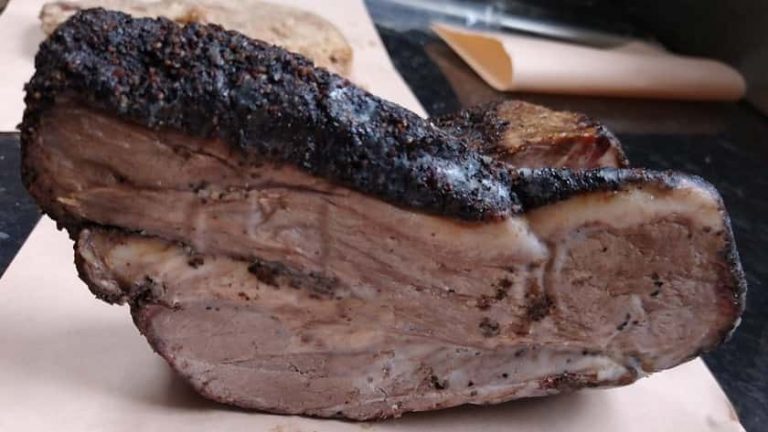Are Lays BBQ Chips Vegan?
Craving a delicious snack but not sure if Lays BBQ Chips are vegan-friendly? We’ve got you covered! In this article, we’ll explore the ingredients in Lays BBQ Chips and determine if they contain any animal-derived products.
We’ll also delve into what it means for a food product to be considered vegan, and discuss the importance of checking labels for vegan-friendly options. Plus, we’ll provide some tasty alternatives to Lays BBQ Chips for our vegan readers. Stick around to learn more about making informed choices when it comes to choosing vegan snacks.
Are Lays BBQ Chips Vegan?
Are Lays BBQ Chips vegan? This question arises from the growing interest in vegan snacks and plant-based diet choices.
Many people are looking for vegan-friendly snack options, and Lays BBQ Chips have garnered attention due to their flavorful taste and widespread availability.
When determining if a product is vegan, it’s essential to carefully examine the ingredients list and food labels. In the case of Lays BBQ Chips, potential consumers should note that the product contains a blend of spices and natural flavors, which are often indicative of non-vegan ingredients.
It’s crucial to understand the distinction between vegan and non-vegan products, as even seemingly plant-based snacks may contain animal-derived additives. Therefore, individuals following a strict vegan diet should consider these factors before including Lays BBQ Chips in their snack choices.
What Are The Ingredients In Lays BBQ Chips?
The ingredients in Lays BBQ Chips play a crucial role in determining their suitability for vegan consumption.
The primary ingredients in Lays BBQ Chips include potatoes, vegetable oil (sunflower, corn, and/or canola oil), sugar, salt, maltodextrin, yeast extract, onion powder, and spices.
While the vegetable oil and spices are derived from plants, some of the flavors used in the chips may contain animal products or by-products, such as dairy ingredients or chicken fat. It’s important for individuals following a vegan diet to carefully check the ingredient list to ensure that animal-derived ingredients are not present, as flavorings can sometimes be deceiving.
Checking the ingredient list is essential to maintain the vegan status of the product and make informed dietary choices.
Are There Any Animal-Derived Ingredients In Lays BBQ Chips?
The presence of animal-derived ingredients in Lays BBQ Chips is a critical consideration for individuals with dietary restrictions or those following a vegan or vegetarian diet.
For non-vegan and vegetarian consumers, understanding the use of animal products in food items like Lays BBQ Chips is crucial. Food labels play a pivotal role in providing transparency regarding the ingredients used, enabling individuals to make informed choices.
As allergen concerns are paramount, clear labeling facilitates easier identification of meat-based components, ensuring those with dietary restrictions can consume snacks with confidence. Exploring the significance of food labels in relation to animal-derived ingredients brings attention to the impact on diverse consumer preferences and dietary requirements.
What Makes A Food Product Vegan?
Understanding what makes a food product vegan is essential for individuals adhering to plant-based or vegetarian diets and those with specific dietary restrictions.
Veganism primarily revolves around the absence of any animal-derived ingredients, such as meat, dairy, eggs, and honey, and the emphasis on plant-based components.
When examining food labels, a vegan product should not contain any animal products or by-products, with some also indicating their vegan status through specific logos or certifications.
This distinction is crucial for individuals aligning with vegetarian or vegan dietary preferences due to ethical, environmental, or health-related considerations.
Embracing veganism reflects a broader commitment to sustainable and cruelty-free consumption, impacting not only individual dietary choices but also advocating for a more environmentally conscious and compassionate food industry.
What Does Vegan Mean?
The term vegan encompasses a dietary approach that prioritizes plant-based foods and avoids animal-derived products, catering to individuals with diverse dietary restrictions and preferences.
This dietary choice is rooted in principles that advocate for the well-being of animals, environmental sustainability, and personal health.
By embracing a plant-based diet, vegans aim to reduce animal exploitation and contribute to a more sustainable food system. Veganism extends its impact beyond individuals’ dietary habits, shaping broader conversations about ethical consumption and environmental consciousness in the context of modern dietary choices.
What Ingredients Are Not Considered Vegan?
Certain ingredients, such as animal products, meat-based additives, and non-vegan flavorings, are excluded from the vegan category due to their origins and potential impact on vegetarian and non-vegan individuals.
These types of ingredients can include dairy, eggs, gelatin, and honey, all of which are derived from animal sources. Certain food colorings, such as carmine (derived from insects), and some additives like casein (a milk protein) are also deemed non-vegan.
For individuals following a vegan lifestyle, encountering these ingredients could pose challenges and potential allergen risks. It is important for those adhering to vegetarian or non-vegan dietary preferences to carefully read labels and be aware of these potential inclusions to make informed choices.
What Are The Alternatives To Lays BBQ Chips For Vegans?
For individuals seeking vegan snack options, there are several alternatives to Lays BBQ Chips that cater to plant-based preferences and offer diverse snack options.
There are many options for vegan snacks that cater to dietary requirements and offer a variety of flavors and textures. These include organic vegetable chips, air-popped popcorn with herbs and spices, and homemade alternatives like kale chips, roasted chickpeas, and sweet potato fries. Additionally, plant-based ingredients like nutritional yeast, coconut aminos, and non-dairy cheese flavors can be used to make tasty and satisfying vegan snacks.
Homemade BBQ Chips
Creating homemade BBQ chips presents a customizable and vegan-friendly snack option, allowing individuals to incorporate plant-derived ingredients and tailor the flavors to their preferences.
Experiment with different flavor profiles by using ingredients like sweet potatoes, kale, or even beets. You can opt for a smoky paprika kick or a tangy barbeque twist, thanks to the flexibility in seasoning and spices. This offers an exciting culinary adventure for your taste buds.
For vegan individuals, homemade BBQ chips are a perfect option as they provide a healthier and cruelty-free alternative to store-bought options. The satisfaction of creating a homemade snack from scratch adds an extra layer of enjoyment to the entire experience.
Other Vegan Chip Brands
Exploring other vegan chip brands expands the range of snack options available to individuals adhering to plant-based diets, providing diverse and flavorful alternatives to Lays BBQ Chips.
They often incorporate a variety of plant-derived ingredients such as chickpeas, lentils, kale, and sweet potatoes, ensuring a rich and satisfying snacking experience. Brands like Terra Chips, Hippeas, and Rhythm Superfoods offer a wide range of flavors including sea salt, spicy sriracha, and tangy barbecue, catering to diverse taste preferences. These vegan chip products not only cater to the dietary needs of vegans but also appeal to health-conscious consumers, as they are often lower in fat and calories compared to traditional potato chips.
Other Snack Options
Beyond BBQ chips, there is a wide array of vegan snack options available, ranging from savory to sweet, and encompassing a variety of plant-derived ingredients to suit diverse dietary preferences.
These alternative snack options are gaining greater appeal among individuals seeking delicious and healthy choices. Whether it’s delectable kale chips, protein-packed chickpea snacks, or indulgent dairy-free chocolate bars, there is something to cater to everyone’s taste buds.
The availability of these vegan snacks not only caters to those following a plant-based diet but also to individuals with various dietary restrictions or preferences, making them an inclusive and versatile choice for snack time indulgence.
Is It Important To Check Labels For Vegan-Friendly Products?
Checking labels for vegan-friendly products holds significant importance in the context of making informed food choices. With the prevalence of vegan snacks and the diversity of the food industry, it’s crucial to carefully examine nutrition labels to ensure that products align with dietary restrictions. It’s also necessary to be aware of potential allergens that may be present.
By understanding food packaging, consumers can gain insight into how the product was sourced and processed. This information can influence ethical and sustainable choices, empowering individuals to make conscientious decisions. Additionally, it encourages the food industry to prioritize transparency and cater to the increasing demand for vegan options.
What Are The Benefits Of Choosing Vegan Products?
Choosing vegan products offers numerous benefits, including catering to diverse dietary needs, supporting the growth of the food industry, and providing access to varied and nutritious snack options.
For those with dietary restrictions, vegan products are often a reliable and satisfying choice. The growing demand for vegan options has prompted food companies to expand their offerings, ultimately benefiting consumers of all preferences.
From plant-based protein bars to veggie chips and dairy-free chocolates, the variety of delicious and nutritious snacks available in the vegan market extends beyond just dietary considerations. These products also appeal to those seeking healthier and more environmentally-friendly choices.
Are There Any Risks Of Consuming Non-Vegan Products?
Consuming non-vegan products presents potential risks related to food safety, nutrition facts, and the broader impact on the food industry, warranting attention to the selection of suitable snack options.
When it comes to non-vegan products, it’s important to consider the potential health hazards they may pose. Factors such as contamination, allergens, and additives should be taken into account. Additionally, the nutritional composition of these products may not align with balanced dietary requirements, potentially leading to deficiencies in essential nutrients.
On a larger scale, the food industry’s reliance on non-vegan products can have environmental and ethical implications. This drives the demand for more sustainable and cruelty-free snack options. Therefore, it’s crucial to make informed choices about snack consumption for both individual well-being and shaping the future of the food industry.
How To Make Sure A Product Is Vegan?
Ensuring the vegan status of a product involves considerations such as vegan certification labels, thorough examination of ingredient lists, and an understanding of the snack market and food manufacturing practices.
When searching for vegan products, it’s crucial to look for recognized vegan certification labels. These labels provide assurance that the product meets strict criteria for being vegan-friendly.
It’s also important to carefully scrutinize the ingredient list to identify any non-vegan components. With the increasing demand for vegan snacks, it’s essential to understand the snack market and how food is manufactured, as this can impact the product’s vegan status.
By being mindful of these factors, consumers can make informed choices that align with their values and dietary preferences.
Look For Vegan Certification Labels
Vegan certification labels serve as crucial indicators of a product’s suitability for plant-based diets. They reflect the alignment with specific snack brands and adherence to vegan-friendly food manufacturing practices amidst relevant food regulations.
These labels play a significant role in helping consumers make informed choices. They provide assurance that the products have met the standards for vegan certification.
This certification ensures that the ingredients and production processes align with the requirements for vegan products. It reinforces the trust and credibility of the brands associated with the labels.
The presence of such certification labels also contributes to the overall growth of the vegan food market. It promotes transparency and integrity within the industry.
Check Ingredients List Carefully
Thoroughly examining the ingredients list is essential in determining the vegan status of a product, considering the relevance of product labels and their adherence to food production standards and labeling laws.
By carefully reviewing the ingredients, consumers can ensure that the product aligns with their dietary choices and ethical considerations.
Labels displaying certifications such as ‘Vegan Certified’ or ‘Cruelty-Free’ provide valuable assurance. Understanding food production standards and the legal requirements for labeling empowers individuals to make informed decisions when selecting vegan products, contributing to an increased demand for ethical and sustainable options in the market.
Research The Brand’s Values And Practices
Researching a brand’s values and practices provides insight into its commitment to vegan-friendly products, food safety, compliance with food requirements, and overall approach to consumer preferences.
Understanding a brand’s ethos and operational methods enables consumers to make informed choices aligning with their values and dietary needs. This research helps uncover the authenticity of a brand’s claims and can safeguard against potential food safety risks.
It empowers individuals to support businesses that prioritize ethical and sustainable practices, fostering a positive impact on the broader market and encouraging other companies to adapt to changing consumer demands.






